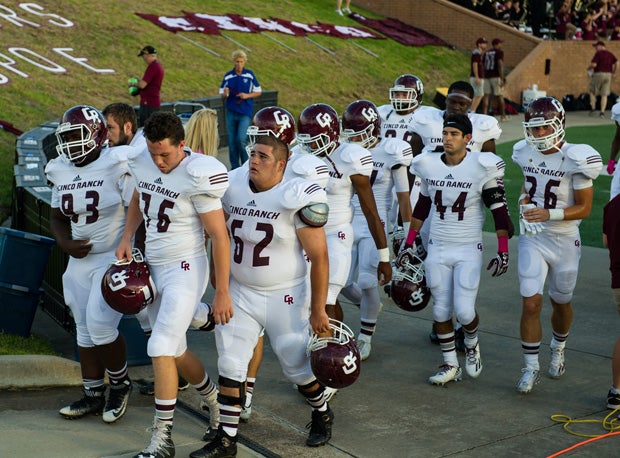There is a time and place for everything you say to your team, so be careful after games end.
Video: Top Hits of the Week - Oct. 12
See some awesome big hits from last season.Being a head coach can be very difficult at times. All eyes on you, all the time. All ears listening to you, all the time.
Being a head coach can be thrilling at times because of the same reasons. You get to be the voice of the program, the voice of the coaching staff, and in many cases, the voice of the school and community.
What you say to your team after a game, and maybe more importantly how you say it, is critical. Many of these kids under your care hang on every word you have to say. I graduated from high school in 1994, and still remember some of the things our coaches said after certain games.
And I also remember things I have said after games to my teams over the years as a head coach. Some of those, I regret. I let emotions take over in the heat of the moment. I didn't think very rationally in my early years as a head coach at 27 years old.
Here are five things to remember for your post-game speech.

Sometimes addressing players after they walk off the field can lead to better post-game speeches.
Photo by Mark Goodman
You are an educator. The field is the classroom. Remember these are just kids, they are not your peers. They are impressionable. They are real people. If you've just lost a tough game, they feel awful, too. It's not just you. In fact, in all reality, they might even feel worse than you do, as it maybe was their last homecoming or their last rivalry game ever; you still have next year, and the next. Do not allow your emotions to take over just to make yourself feel a little better. That's not the purpose of a post-game speech.
2. They will remember what you say for a long, long time.Be careful with your words. Use them wisely. Think critically about what really needs to be said that night. If you use phrases like "We absolutely suck," or "Y'all aren't going to win a game all season," these kids will return to practice on Monday thinking the same thing. How do you get them to work hard again after using such phrases?
3. Everyone is going to ask "What did coach say?"Again, not only will your kids remember what you've said for a long time, but so will their parents, your co-workers on campus, the media, etc. Everybody wants to know what coach said. I even ask my 9-year-old son who plays rec league basketball after his games. I'm interested to know what's being said.
4. Sometimes, coaches make mistakesOne of the most humbling things that you can do for your football team, and sometimes the best thing that you can do for it, is to accept responsibility for your own mistakes or the mistakes of your staff during the game. Maybe you made a poor fourth-down decision that swung the dynamics of the game, or got away from the game plan because you were not patient enough. Whatever the case, the kids probably know if the staff made a critical error or a few of them, they led to a loss. If that's the case, suck it up. Take a little pressure off your team by taking it on the chin and admitting it.
5. Say nothing?Sometimes the most effective thing that you can say is nothing at all. Maybe it has just been one of those nights when your team totally under-performed, and you are HOT about it. Is now really the time to go off on the team? Is it the most effective way to prove your point that the team made mental mistakes, or that they didn't play tough enough? I can't make that decision here behind a keyboard. Only you will know that.
If you don't have anything to say that will be effective, have a lead assistant say a few words, or that one coach who is Mr. Positive. Keep it simple, and quick, and send them on their way.
Cooling off periodLastly, take a few minutes if you need to. Most high school coaches address their teams right there on the field. Usually there is no cooling off period if you do this. In my second year as a head coach, when I had some eyes and ears in the post-game speech that I wasn't comfortable with (long story, administrators with kids on the team), I simply addressed the kids in the locker room after each game, similar to what you see in college and the NFL. We would shake hands with the opponent, and then I would give them some time to see their parents and girlfriends.
This was probably the best thing I ever did regarding the post-game speech. I would walk with my lead assistant/defensive coordinator, and we would chat about what needed to be said. I treasured his wisdom as a 25-year coaching veteran. I was able to measure my words, come up with a few key points from the night and have an effective meeting before sending them home.
Chris Fore is a veteran Head Football Coach and Athletic Director
from Southern California. He consults coaches and programs nationwide
through his business Eight Laces Consulting.